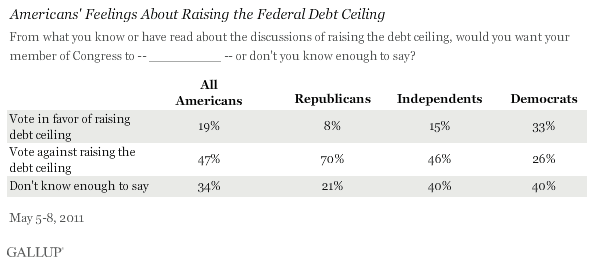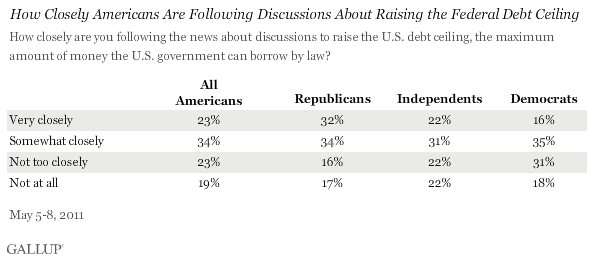PRINCETON, NJ -- By a 47% to 19% margin, Americans say they would want their member of Congress to vote against raising the U.S. debt ceiling, while 34% don't know enough to say. Republicans oppose raising the debt ceiling by 70% to 8% and independents by 46% to 15%. Democrats favor raising the ceiling by 33% to 26%.

These results are based on a May 5-8 Gallup poll, which asked Americans about the issue but did not offer reasons for or against raising the debt ceiling. The Congress is generally expected to pass debt ceiling legislation, although it is unclear what additional provisions will be needed in order to secure passage.
Majority of Americans Are Following Debt Ceiling Issue
A majority of Americans (57%) say they are closely following the news about "discussions to raise the U.S. debt ceiling, the maximum amount of money the U.S. government can borrow by law." Republicans are following the issue more closely than are Democrats and independents; upper-income Americans are following it more closely than lower-income Americans; and those with a postgraduate education more so than those with a high school education or less.

Americans are more likely to oppose than favor raising the debt ceiling, regardless of how closely they are following the news about the issue. Among the 23% who are following the debt ceiling discussion very closely, 62% are opposed and 25% are in favor of raising the current ceiling. Among those who are following the issue less closely, opposition outnumbers support by at least a 2-to-1 margin.
Implications
The U.S. Treasury Department expects that the U.S. government will technically reach its $14.3 trillion debt ceiling on Monday, May 16. The May 5-8 Gallup poll suggests that a vote in favor of raising the debt ceiling could be a difficult one for many members of Congress, particularly for Republicans.
Resolution of the issue is likely to take considerable time and maneuvering. Members of both parties will need to come to agreement on legislation that adds enough spending cuts, tax changes, and perhaps budget processes -- such as requirements to force spending reductions if the ratio of government spending to GDP reaches a certain point -- that can garner a majority of votes in both houses of Congress.
In one sense, this is more of a political than a financial issue. As former Federal Reserve Chairman Alan Greenspan noted, the Congress has already passed legislation spending the money at stake, so there seems to be little choice but to allow the Treasury to raise the funds it needs to meet the government's obligations. Federal Reserve Chairman Ben Bernanke and Treasury Secretary Tim Geithner have also noted that raising the debt ceiling is financially essential. In this same vein, many on Wall Street and many investors around the world seem confident that after the required political battling, the Congress will raise the U.S. debt ceiling.
Americans conditioned by so much news coverage of the enormous federal budget deficit may be reacting to the idea of raising the debt ceiling more in the context of a political deficit discussion as opposed to a financial market implications context. Nevertheless, the public's perceptions are clearly negative, suggesting the debt ceiling vote is a political hurdle lawmakers will need to overcome.
Probably anticipating that eventuality, the Treasury seems to be working on plans to extend its financing efforts so that it will be Aug. 2 before default potentially becomes a reality. In turn, this lag time could create considerable uncertainty in the global financial markets as the summer progresses.
Regardless, it may be worthwhile to think back to what happened with the financial bailout legislation -- the so-called TARP -- in 2008. This was another unpopular piece of financial legislation that the president, the Treasury secretary, and the Fed chairman all supported, saying it was essential for global stability. After first voting this legislation down and watching the markets plunge, the Congress passed TARP. Efforts to pass unpopular legislation to raise the debt ceiling could create similar challenges.
Survey Methods
Results for this Gallup poll are based on telephone interviews conducted May 5-8, 2011, with a random sample of 1,018 adults, aged 18 and older, living in all 50 U.S. states and the District of Columbia.
For results based on the total sample of national adults, one can say with 95% confidence that the maximum margin of sampling error is ±4 percentage points.
Interviews are conducted with respondents on landline telephones and cellular phones, with interviews conducted in Spanish for respondents who are primarily Spanish-speaking. Each sample includes a minimum quota of 400 cell phone respondents and 600 landline respondents per 1,000 national adults, with additional minimum quotas among landline respondents for gender within region. Landline telephone numbers are chosen at random among listed telephone numbers. Cell phone numbers are selected using random-digit-dial methods. Landline respondents are chosen at random within each household on the basis of which member had the most recent birthday.
Samples are weighted by gender, age, race, Hispanic ethnicity, education, region, adults in the household, and phone status (cell phone only/landline only/both, cell phone mostly, and having an unlisted landline number). Demographic weighting targets are based on the March 2010 Current Population Survey figures for the aged 18 and older non-institutionalized population living in U.S. telephone households. All reported margins of sampling error include the computed design effects for weighting and sample design.
In addition to sampling error, question wording and practical difficulties in conducting surveys can introduce error or bias into the findings of public opinion polls.
View methodology, full question results, and trend data.
For more details on Gallup's polling methodology, visit www.gallup.com.
